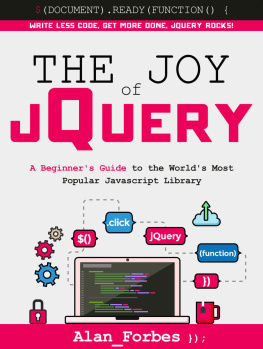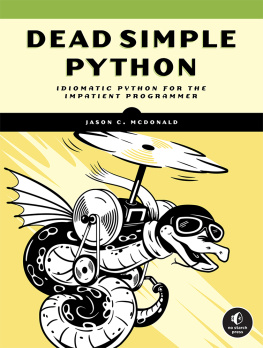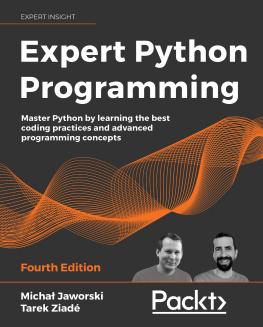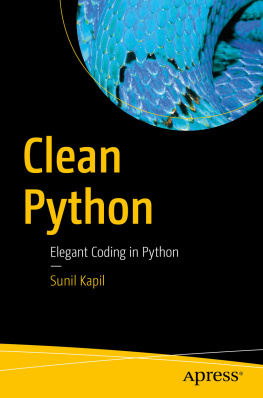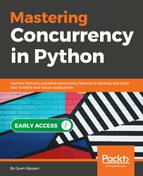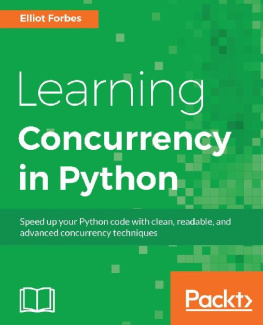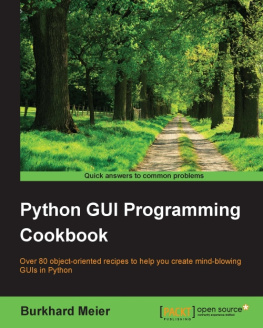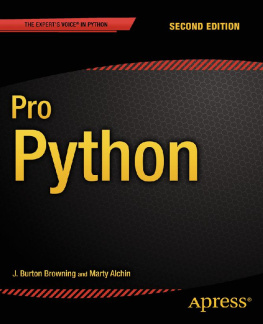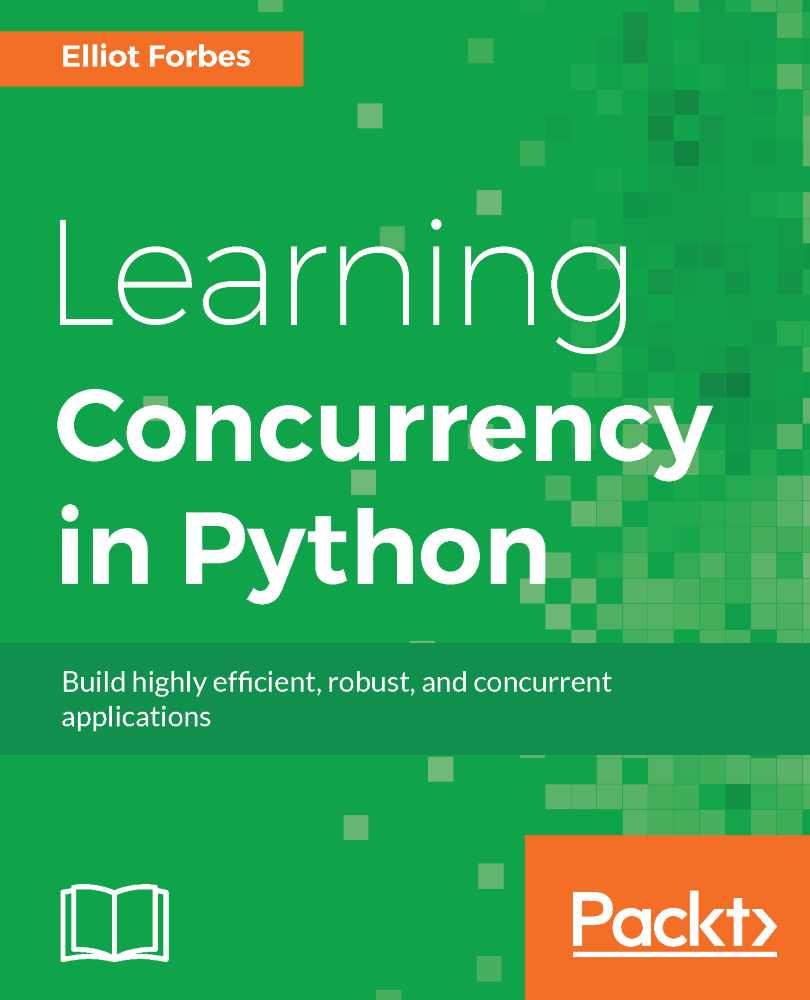
Learning Concurrency in Python
Build highly efficient, robust, and concurrent applications
Elliot Forbes

BIRMINGHAM - MUMBAI
Learning Concurrency in Python
Copyright 2017 Packt Publishing
All rights reserved. No part of this book may be reproduced, stored in a retrieval system, or transmitted in any form or by any means, without the prior written permission of the publisher, except in the case of brief quotations embedded in critical articles or reviews.
Every effort has been made in the preparation of this book to ensure the accuracy of the information presented. However, the information contained in this book is sold without warranty, either express or implied. Neither the author, nor Packt Publishing, and its dealers and distributors will be held liable for any damages caused or alleged to be caused directly or indirectly by this book.
Packt Publishing has endeavored to provide trademark information about all of the companies and products mentioned in this book by the appropriate use of capitals. However, Packt Publishing cannot guarantee the accuracy of this information.
First published: August 2017
Production reference: 1140817
Published by Packt Publishing Ltd.
Livery Place
35 Livery Street
Birmingham
B3 2PB, UK.
ISBN 978-1-78728-537-8
www.packtpub.com

Credits
Author Elliot Forbes | Copy Editor
Sonia Mathur |
Reviewer
Nikolaus Gradwohl | Project Coordinator
Vaidehi Sawant |
Commissioning Editor
Merint Mathew | Proofreader
Safis Editing |
Acquisition Editor
Chaitanya Nair | Indexer
Francy Puthiry |
Content Development Editor
Rohit Kumar Singh | Graphics
Abhinash Sahu |
Technical Editors
Ketan Kamble | Production Coordinator
Nilesh Mohite |
About the Author
Elliot Forbes has worked as a full-time software engineer at a leading financial firm for the last 2 years. He graduated from the University of Strathclyde in Scotland in the spring of 2015 and worked as a freelancer developing web solutions while studying there.
He has worked on numerous different technologies such as GoLang and NodeJS and plain old Java, and he has spent years working on concurrent enterprise systems. It is with this experience that he was able to write this book.
Elliot has even worked at Barclays Investment Bank for a summer internship in London and has maintained a couple of software development websites for the last 3 years.
About the Reviewer
Nikolaus Gradwohl was born 1976 in Vienna, Austria and always wanted to become an inventor like Gyro Gearloose. When he got his first Atari, he figured out that being a computer programmer is the closest he could get to that dream. For a living, he wrote programs for nearly anything that can be programmed, ranging from an 8-bit microcontroller to mainframes. In his free time, he likes to master on programming languages and operating systems.
Nikolaus authored the Processing 2: Creative Coding Hotshot book, and you can see some of his work on his blog at http://www.local-guru.net/.
www.PacktPub.com
For support files and downloads related to your book, please visit www.PacktPub.com .
Did you know that Packt offers eBook versions of every book published, with PDF and ePub files available? You can upgrade to the eBook version at www.PacktPub.com and as a print book customer, you are entitled to a discount on the eBook copy. Get in touch with us at service@packtpub.com for more details.
At www.PacktPub.com , you can also read a collection of free technical articles, sign up for a range of free newsletters and receive exclusive discounts and offers on Packt books and eBooks.

https://www.packtpub.com/mapt
Get the most in-demand software skills with Mapt. Mapt gives you full access to all Packt books and video courses, as well as industry-leading tools to help you plan your personal development and advance your career.
Why subscribe?
- Fully searchable across every book published by Packt
- Copy and paste, print, and bookmark content
- On demand and accessible via a web browser
Customer Feedback
Thanks for purchasing this Packt book. At Packt, quality is at the heart of our editorial process. To help us improve, please leave us an honest review on this book's Amazon page at https://www.amazon.com/dp/1787285375.
If you'd like to join our team of regular reviewers, you can e-mail us at customerreviews@packtpub.com. We award our regular reviewers with free eBooks and videos in exchange for their valuable feedback. Help us be relentless in improving our products!
Preface
Python is a very high-level, general-purpose language that features a large number of powerful high-level and low-level libraries and frameworks that complement its delightful syntax. This easy-to-follow guide teaches you new practices and techniques to optimize your code and then moves on to more advanced ways to effectively write efficient Python code. Small and simple practical examples will help you test the concepts introduced, and you will be able to easily adapt them to any application.
Throughout this book, you will learn to build highly efficient, robust, and concurrent applications. You will work through practical examples that will help you address the challenges of writing concurrent code, and also you will learn to improve the overall speed of execution in multiprocessor and multicore systems and keep them highly available.
What this book covers
, Speed It Up!, helps you get to grips with threads and processes, and you'll also learn about some of the limitations and challenges of Python when it comes to implementing your own concurrent applications.
, Parallelize It, covers a multitude of topics including the differences between concurrency and parallelism. We will look at how they both leverage the CPU in different ways, and we also branch off into the topic of computer system design and how it relates to concurrent and parallel programming.
, Life of a Thread, delves deeply into the workings of Python's native threading library. We'll look at the numerous different thread types. We'll also look in detail at various concepts such as the multithreading model and the numerous ways in which we can make user threads to their lower-level siblings, the kernel threads.
Next page

